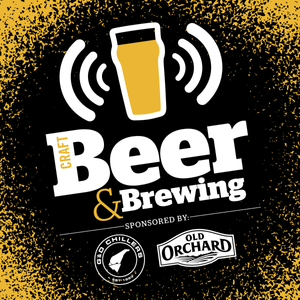
#4: Over Fermentation and Brettanomyces
10/28/19 • 21 min
1 Listener
I find the term "over fermentation" to be especially annoying. From a biology point of view this term is nonsense.
When coffee professionals use this term it's understood to mean a defect, usually vinegar, "boozy" or like rotting fruit. Everyone agrees that it's a negative trait for a coffee to have. I think it's important to be able to identify this trait but I think this label has held fermentation back and made many (producers and roasters alike) shy away from a process that when controlled can enhance coffee quality.
In this week's episode I answer a listener question about double fermentation and Brettanomyces that gives me an opportunity to untangle the concept from the name we've given it.
"Double fermentation" is another common colloquial phrase mistaken for a scientific label.
It gives the impression that there are two fermentations, but this is not what's happening biologically.
I also talk about the Russian River Brewing Company in Windsor California. I visited earlier this year in July and got to see how they use Brettanomyces and try their Brett Beer. The coffee industry is borrowing from the Beer industry as well as the wine industry and beer yeasts are becoming more popular in mills across Central America. This is an exciting time for coffee microbiology but there are a few cautions I want to give about this particular yeast.
For the visually inclined: I have 3 videos that will breakdown the coffee fermentation process:
https://www.luxia.coffee/instructional-videos
I find the term "over fermentation" to be especially annoying. From a biology point of view this term is nonsense.
When coffee professionals use this term it's understood to mean a defect, usually vinegar, "boozy" or like rotting fruit. Everyone agrees that it's a negative trait for a coffee to have. I think it's important to be able to identify this trait but I think this label has held fermentation back and made many (producers and roasters alike) shy away from a process that when controlled can enhance coffee quality.
In this week's episode I answer a listener question about double fermentation and Brettanomyces that gives me an opportunity to untangle the concept from the name we've given it.
"Double fermentation" is another common colloquial phrase mistaken for a scientific label.
It gives the impression that there are two fermentations, but this is not what's happening biologically.
I also talk about the Russian River Brewing Company in Windsor California. I visited earlier this year in July and got to see how they use Brettanomyces and try their Brett Beer. The coffee industry is borrowing from the Beer industry as well as the wine industry and beer yeasts are becoming more popular in mills across Central America. This is an exciting time for coffee microbiology but there are a few cautions I want to give about this particular yeast.
For the visually inclined: I have 3 videos that will breakdown the coffee fermentation process:
https://www.luxia.coffee/instructional-videos
Previous Episode

#3: The Best Cup of Coffee I've Ever Had
If you made it through last week's deep dive about how we talk about and label specialty coffee - you've earned your coffee-nerd badge!
This week I want to pull back the lens and talk more broadly about quality and value. Instead of examining the rigidity of microbiology, this week's episode explores the subjective side of preference and what makes something "good".
I tell you a little about my coffee tasting history and share the story of the best (and worst) cup of coffee I've ever had.
Next Episode

#5: To Be or Not To Be A Q-Grader
What is a Q Grader?
In the coffee industry the Q Grader license is often compared to the sommelier exam in wine—this is a shorthand that can be useful to provide some vague ballpark approximation, but over the next 2 podcast episodes we will see how different these tests are.
When I started to get serious about working in the coffee industry I was looking for ways to deepen my knowledge and the Q Grader license seemed like a good place to start. If I wanted to use fermentation techniques to improve coffee quality I would need to learn what the industry considered to be high quality.
Because how can we agree on what is coffee quality, without speaking the same sensory language?
To move the conversation of quality forward, I needed to differentiate between preference (coffees people like) and quality (agreed upon criteria that are independent of preference).
I have definitely scored high quality coffees that were not in my preferred flavor profile—conversely just liking a coffee is not enough to qualify it as a good coffee. It needs to meet quality standards of acidity, structure, body, sweetness and balance. I believe it is important to be able to put our personal preferences in context when evaluating a coffee.
Join me on today's episode as I share my experience with the Q Grader license.
To take a sensory class from Alexandre Schmitt: https://www.wineandflavors.com/en/
Maybe we can revive the hashtag: #letcoffeebecoffee
If you like this episode you’ll love
Episode Comments
Generate a badge
Get a badge for your website that links back to this episode
<a href="https://goodpods.com/podcasts/making-coffee-with-lucia-solis-218136/4-over-fermentation-and-brettanomyces-24702094"> <img src="https://storage.googleapis.com/goodpods-images-bucket/badges/generic-badge-1.svg" alt="listen to #4: over fermentation and brettanomyces on goodpods" style="width: 225px" /> </a>
Copy




